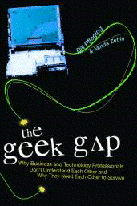Voting Machines are a Geek Gap Issue
Voting machines, especially the touch-screen variety, have been in the headlines for several years now, and no one seems to be able to (or, possibly more likely, wants to) resolve the problems. Voting machine maker Diebold, which donated hundreds of thousands of dollars to Republican campaigns (and whose CEO Wally O'Dell was famously quoted saying he would "...deliver Ohio electoral votes for Bush..." prior to the disasterous 2004 Presidential vote count in that state), are now responsible for delivering more than 80% of the votes cast in US elections. These machines run on propietary software the company refuses to open for full scrutiny by impartial technologists. Need more reasons to not trust this company? The Senior Vice-President/Senior Programmer of Diebold software creation is a convicted felon (23 counts of felony theft for planting back doors in software he created for ATMs) and who also employed a number of other convicted felons in senior positions, including a fraudulent securities trader and a drug trafficker.
Then there's Sequoia Systems, another maker of voting touch-screen machines. They're majority owned by Venezuelans, and there's some question that there may be ties between the Chavez government and Sequoia management. Plus, their machines seem to be even easier to hack than Diebold machines.
But let's just forget the partisan political mistrust for a moment. All this brouhaha over the software could be eliminated in one single stroke - by using completely free, easily verified Open Source software to run the machines. Not only has this been proposed time and again, but it's already been done. Australia spent 6 months creating a Linux-based version, allowed all political groups to examine and test it before using it, then used it in a limited way (8.3% of votes cast) for a 2001 parliamentary election, which went off without a hitch. They now are using it in a national 2006 election, and no one has a single complaint about hidden agendas or secret vote fixing - at least regarding the software in the touch-screen machines they're using.
So why don't we do something similar, or for that matter just download the well-tested Australian version and use that? Good question, and I think that at least part of the answer can be blamed on the Geek Gap.
The Help America Vote Act (HAVA) of 2002 is forcing states to replace punch ballots and (reliable, mechanical, uncheat-able) lever machines with either optical-scan (fill in the dot) or touch-screen vote tallying machines. Ultimately, the decision of which voting machines to use is being made by various state and county electoral boards. While these folks are, I'm sure, good citizens who want to do the best thing, they are also people not qualified to make this kind of judgement. These are decisions about computers. Past decisions made by electoral boards had more to do with things like how to display the candidates on the paper ballots, or how to comply with handicapped access issues, and they could rely on easily understood information to make an informed choice. Serious questions about ways voting software can be compromised is completely beyond their scope. Also, understand that, being almost completely made up of non-technological workers, they live in a world in which they trust a software maker to deliver what they say they deliver. Their Apple iMac or Windows XP computer just works, and how it does what it does is not something they need to ever concern themselves with. Same with this - how these touch-screen systems do what they do is as much a mystery as the transmission on their SUV, it just works. Why question something that just works?
Geeks have tried to make the political suits understand the serious flaws in these systems, but they seem to be generally viewed as individuals outside of the system, not ones who might actually be part of it, contributing something. While some states are delaying adopting these machines because they simply don't have the information they need to deal with this, other states are simply jumping in without giving the questions a solid look.
Neither is a good approach. Geeks need very much to be brought into the center of these issues and made an integral part of this process, not just testify a couple times and leave it at that.
So......what do YOU think?
Then there's Sequoia Systems, another maker of voting touch-screen machines. They're majority owned by Venezuelans, and there's some question that there may be ties between the Chavez government and Sequoia management. Plus, their machines seem to be even easier to hack than Diebold machines.
But let's just forget the partisan political mistrust for a moment. All this brouhaha over the software could be eliminated in one single stroke - by using completely free, easily verified Open Source software to run the machines. Not only has this been proposed time and again, but it's already been done. Australia spent 6 months creating a Linux-based version, allowed all political groups to examine and test it before using it, then used it in a limited way (8.3% of votes cast) for a 2001 parliamentary election, which went off without a hitch. They now are using it in a national 2006 election, and no one has a single complaint about hidden agendas or secret vote fixing - at least regarding the software in the touch-screen machines they're using.
So why don't we do something similar, or for that matter just download the well-tested Australian version and use that? Good question, and I think that at least part of the answer can be blamed on the Geek Gap.
The Help America Vote Act (HAVA) of 2002 is forcing states to replace punch ballots and (reliable, mechanical, uncheat-able) lever machines with either optical-scan (fill in the dot) or touch-screen vote tallying machines. Ultimately, the decision of which voting machines to use is being made by various state and county electoral boards. While these folks are, I'm sure, good citizens who want to do the best thing, they are also people not qualified to make this kind of judgement. These are decisions about computers. Past decisions made by electoral boards had more to do with things like how to display the candidates on the paper ballots, or how to comply with handicapped access issues, and they could rely on easily understood information to make an informed choice. Serious questions about ways voting software can be compromised is completely beyond their scope. Also, understand that, being almost completely made up of non-technological workers, they live in a world in which they trust a software maker to deliver what they say they deliver. Their Apple iMac or Windows XP computer just works, and how it does what it does is not something they need to ever concern themselves with. Same with this - how these touch-screen systems do what they do is as much a mystery as the transmission on their SUV, it just works. Why question something that just works?
Geeks have tried to make the political suits understand the serious flaws in these systems, but they seem to be generally viewed as individuals outside of the system, not ones who might actually be part of it, contributing something. While some states are delaying adopting these machines because they simply don't have the information they need to deal with this, other states are simply jumping in without giving the questions a solid look.
Neither is a good approach. Geeks need very much to be brought into the center of these issues and made an integral part of this process, not just testify a couple times and leave it at that.
So......what do YOU think?



0 Comments:
Post a Comment
Subscribe to Post Comments [Atom]
<< Home